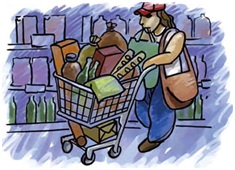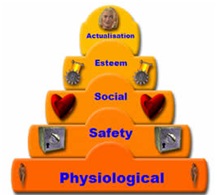|
 |
|
 |
Buyer behaviour Buyer behaviour is... How customers behave when they buy something. Buyers are either organizations or individuals. Organizations buy more but are fewer in number, so their relationship with their suppliers is much closer.
How customers buy something A customer goes through three stages:
1st Need identification
2nd Product search
3rd Purchase and repeat buying.
Here they are in more detail:
1st. Identifying unsatisfied needs
People will buy something to satisfy unsatisfied needs. Abraham Maslow said these needs are:
For example, a Coke can: • Quench thirst (physiological need) • Reassure people that it’s safe to drink (safety). • Associate the buyer with other Coke drinkers (love). • Boost your image (esteem). • Make you a better person (self-actualization).
Businesses are particularly concerned with customer wants that are affected by:
a) customers’ needs (see above) But what they want (e.g. a Coke) is not necessarily what they need (e.g. water). Perceived needs are just as important as actual ones.
b) customers’ personality
c) customers’ situation in life (e.g. age, occupation, lifestyle, children, student, etc.)
d) PEST Factors in the external environment:
2nd. Product search Customers will gather information about different products that can satisfy their unsatisfied needs and wants. These will come from: • Advertising and other media coverage (including word of mouth advertising). • Past experience of the product resulting in brand loyalty – see point 3. • Perceptions and expectations (if people expect something to be good, they are more likely to think that it’s good). • Product surveys and reviews by consumer organizations (like Which? in Britain) and websites (e.g. eBay and Amazon). People are more likely to spend more time on this product search, if a product is expensive (e.g. a car) or technically complex (e.g. computer).
3rd. Purchase and repeat buying Once a product has been bought customers will evaluate its performance. If they are happy (because of quality, brand image and customer service), they will buy it again and so create
brand loyalty. This was a key factor in Google's success.
Key quotes explained
“The chief enjoyment of riches consists in the parade of riches”, - Adam Smith, Scottish economist and philosopher (pictured right). Showing off (or conspicuous consumption) is very important to some customers.
“The play was a great success but the audience was a disaster” - Oscar Wilde, Irish writer, pictured right, after the poor reception for his play, Lady Windermere’s Fan. Never be arrogant enough to think that you know better than the customer.
“There is only one boss. The customer”, - Sam Walton, founder of the American retailer, Wal-Mart Stores (pictured right). “The consumer... is the king”, as the American economist, Paul Samuelson, once said.
Best books
J.K. Galbraith (pictured right), The Affluent Society (1958) People buy things because they are:
|
|
|
||
|
|
|
||
|
||
| Copyright © wisdomtowin.com All Rights Reserved | ||
|




.jpg)




